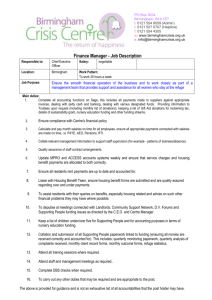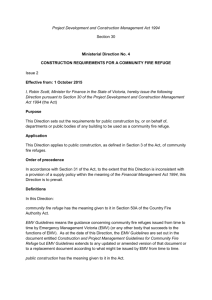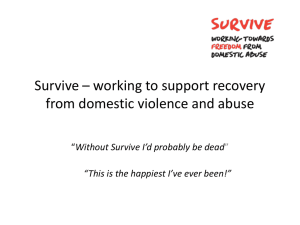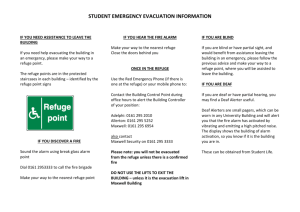Refuge opened the world's first refuge in Chiswick in 1971
advertisement
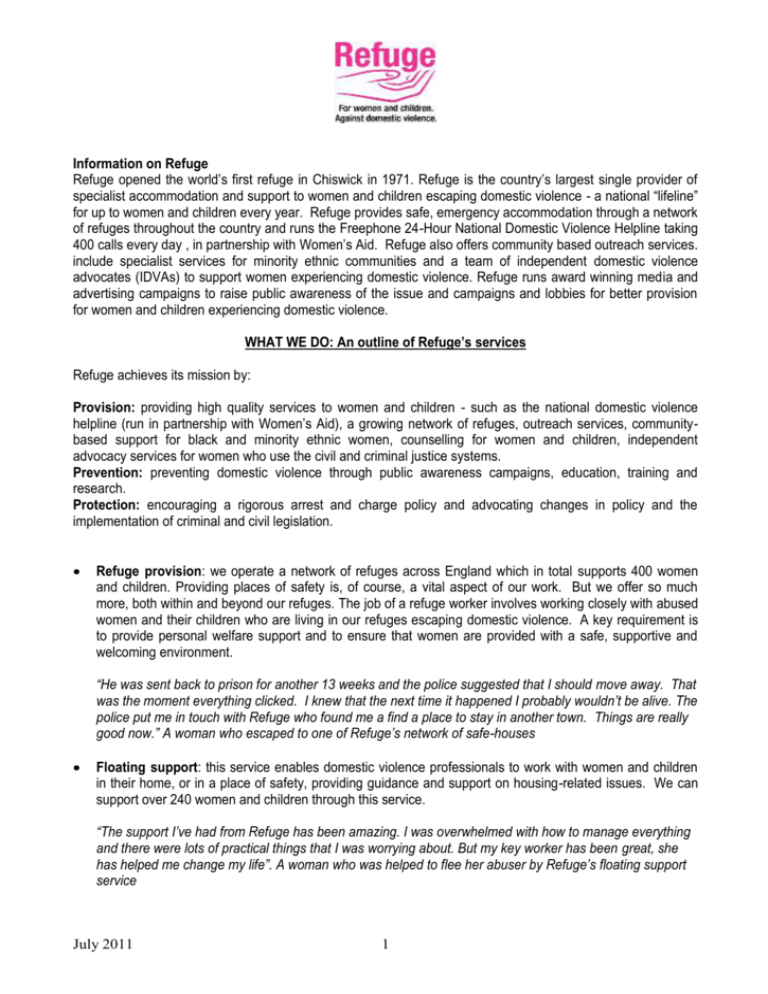
Information on Refuge Refuge opened the world’s first refuge in Chiswick in 1971. Refuge is the country’s largest single provider of specialist accommodation and support to women and children escaping domestic violence - a national “lifeline” for up to women and children every year. Refuge provides safe, emergency accommodation through a network of refuges throughout the country and runs the Freephone 24-Hour National Domestic Violence Helpline taking 400 calls every day , in partnership with Women’s Aid. Refuge also offers community based outreach services. include specialist services for minority ethnic communities and a team of independent domestic violence advocates (IDVAs) to support women experiencing domestic violence. Refuge runs award winning media and advertising campaigns to raise public awareness of the issue and campaigns and lobbies for better provision for women and children experiencing domestic violence. WHAT WE DO: An outline of Refuge’s services Refuge achieves its mission by: Provision: providing high quality services to women and children - such as the national domestic violence helpline (run in partnership with Women’s Aid), a growing network of refuges, outreach services, communitybased support for black and minority ethnic women, counselling for women and children, independent advocacy services for women who use the civil and criminal justice systems. Prevention: preventing domestic violence through public awareness campaigns, education, training and research. Protection: encouraging a rigorous arrest and charge policy and advocating changes in policy and the implementation of criminal and civil legislation. Refuge provision: we operate a network of refuges across England which in total supports 400 women and children. Providing places of safety is, of course, a vital aspect of our work. But we offer so much more, both within and beyond our refuges. The job of a refuge worker involves working closely with abused women and their children who are living in our refuges escaping domestic violence. A key requirement is to provide personal welfare support and to ensure that women are provided with a safe, supportive and welcoming environment. “He was sent back to prison for another 13 weeks and the police suggested that I should move away. That was the moment everything clicked. I knew that the next time it happened I probably wouldn’t be alive. The police put me in touch with Refuge who found me a find a place to stay in another town. Things are really good now.” A woman who escaped to one of Refuge’s network of safe-houses Floating support: this service enables domestic violence professionals to work with women and children in their home, or in a place of safety, providing guidance and support on housing-related issues. We can support over 240 women and children through this service. “The support I’ve had from Refuge has been amazing. I was overwhelmed with how to manage everything and there were lots of practical things that I was worrying about. But my key worker has been great, she has helped me change my life”. A woman who was helped to flee her abuser by Refuge’s floating support service July 2011 1 Community outreach scheme: women from minority groups often face additional barriers in reaching out for help – for example, cultural beliefs surrounding domestic violence make it more difficult for them to leave their abuser and language barriers can make it difficult for them to access mainstream services. Refuge’s discreet service plays a vital role in supporting women who, for a wide range of reasons, would otherwise find it difficult to access specialist services. Outreach workers provide a comprehensive service, offering practical support and information on a range of issues, including housing, welfare, employment and local health services. They also provide vital psychological support. Our community outreach scheme supports over 230 women and children every year. “I’d like to thank Vanya who helped me feel normal again after 30 years of abuse. Vanya gave me hope and courage to start thinking about myself for once, not only about others. The project saved my life and gave me a chance for a better tomorrow.” A woman supported by Refuge’s Eastern European Women’s Outreach Service Independent advocacy: during periods of separation, particularly whilst pursuing legal remedies, a woman is at highest risk of death or serious injury. Our independent advocates help women to keep safe, whilst providing expert guidance through the legal system, helping to secure more convictions for perpetrators of domestic violence. Our team currently operate in four London boroughs and also in Kent, Warwickshire and Coventry. We have the capacity to support 475 women at any given time. “It is impossible for me to say how many lives the independent domestic violence advocates have saved because by successfully supporting prosecutions and holding the guilty accountable, they stop the ever increasing cycle of violence that can lead to serious injury or worse.” PC Fiona Loxton, Community Safety Unit, Walworth, Southwark Children’s support workers - Our specialist child support workers help children to overcome the trauma they have experienced and rebuild their lives. “Amed is gradually starting to talk to other adults and he's becoming a lot less violent towards me. He has started to make some progress at school in reading and writing although he still has difficulties interacting with his classmates.“ Our Refuge child support worker was the first person Amed talked to about the violence he had witnessed. National Domestic Violence Helpline: run in partnership between Refuge and Women’s Aid. Operating 365 days a year, 24 hours a day, the helpline offers emotional support, safety planning and information on a range of issues, including housing, welfare benefits and immigration procedures. Last year it received over 140,000 calls. “I feel stuck for words when I talk about how I feel about it (the helpline). It’s quite emotional for me thinking about it…It’s changed my life. Had I not phoned I could have been murdered and another domestic violence statistic.” Prevention and education: Refuge believes that changing attitudes saves lives. Educating the public and training professionals is not an add-on; it is the only way we will end domestic violence. Our award-winning advertising campaigns reach out to women and children and challenge the destructive myths surrounding domestic violence. Each month our website receives an average of 13,500 visits but during campaign periods this figure increases by 100%. 70% of this traffic goes to the ‘am I being abused?’ and ‘how do I July 2011 2 get help?’ pages. We know our communications activity works – it reaches out to women and helps break their isolation. “I experienced nearly all of the warning signs - I was very closely controlled, criticised and isolated from friends and family. I just didn’t realise that these were the warning signs, I didn't recognise this as domestic violence. If I had known then what I know now, my life would have been quite different." A refuge is so much more than a roof overhead. Although every woman’s story and experiences are different, all the women in our refuges arrive at a time of crisis. Some come after suffering a particularly violent attack; some come as a last resort, on the verge of suicide, after years of abuse; and others come out of fear of what might happen next – to them or their children, often after receiving threats to kill. 25% of the women in our refuges are pregnant. As well as offering a vital place of safety, our staff help women to regain their independence and overcome their traumatic experiences. Each woman who comes to a refuge is assigned a key worker, who offers her emotional support and practical help with anything she needs, such as help to manage her finances, to attend court, to find permanent accommodation, or to settle her children in a new school. When she is ready to move on, we refer her to Refuge’s community services so we can provide ongoing support and can help her and her children adjust to their new lives. July 2011 3
